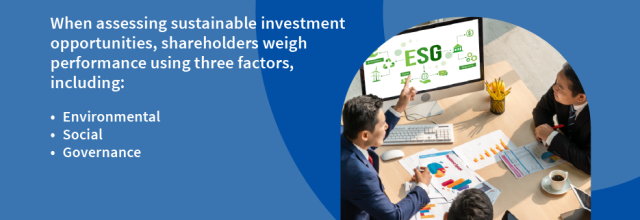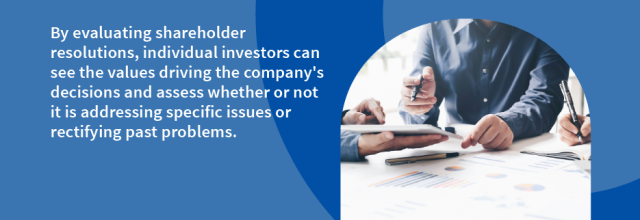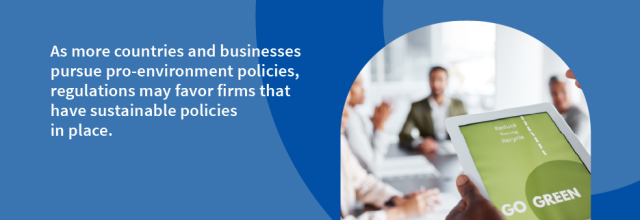What is a Sustainable Investment | Idaho Trust Bank
Published: 04/26/2024
By: Idaho Trust Bank

What Is a Sustainable Investment?
Sustainable investing means seeking out companies that pioneer better ways of doing business. While profits are the ultimate goal of every company, some investors try to support publicly traded firms that bring about positive social or environmental changes.
More and more people are embracing the dual goals of sustainable investment. In 2020, the Global Sustainable Investment Review put the value of all sustainable assets at $35.3 trillion.
A recent poll by Gallup backs up this trend. 63% of investors seek companies that align with their values, while 68% avoid buying stocks of firms that contradict their ethics. While this survey did not focus solely on environmental or social issues, it did prove that many shareholders consider sustainability when purchasing assets.
Keep reading to learn more about sustainable investment opportunities in Boise and how companies and shareholders balance profits with responsibility.
Sustainable Investments
An individual sustainable investment is an asset that has dual goals. In addition to the potential for a positive financial outcome, the stock, bond, or fund seeks to positively impact society or the environment.
For example, sustainable companies to invest in could include those that try to create diversity in their workforce or set up operations in low-income areas with fewer available job opportunities.
Sustainable Investing
Sustainable investing is an overall wealth-growth strategy that balances corporate responsibility, positive social or ecological impact, and long-term financial returns. The sustainable investment approach involves researching companies to assess their positive contributions to target issues. The overall goal of responsible investing is to create a portfolio that produces the desired financial outcome while also seeing results in the areas that are important to you.
This approach is also known as ESG investing. The acronym, which stands for environmental, social, and corporate governance, refers to the three areas that sustainable investors most often try to affect.

Sustainable Investment Criteria
You can assess sustainable investment opportunities using established ESG criteria. Though would-be shareholders can weigh performance in one area, many look at all three factors when selecting companies or funds:
- Environmental. A company's environmental impact can include its industry and operations. For example, a business that makes electric cars or solar panels may positively impact renewable energy adoption. Investors can also assess daily operations, including waste, pollution, carbon emissions, and water use.
- Social. A company's social impact can include positive changes it makes in the communities where it operates. This may involve providing jobs, training, opportunities, or donations to economic development programs. Some companies may engage in these efforts on a global scale. These criteria also include workers' rights, health and safety, and human rights. These issues can cover the company, its suppliers and contractors, and the countries in which it operates.
- Governance. The governance aspect of sustainable investing incorporates how the company is run, its management and decision-making structures, executive compensation, transparency about its operations, and effectiveness in achieving its ESG goals. This area also includes any lobbying efforts and political contributions.
Bloomberg, MCSI, Dow Jones, and Reuters are among the financial information providers that publish ESG-related ratings.
Sustainable Investment Strategies
Investors adopt different strategies depending on their ultimate financial, environmental, or social goals. Overall, however, there are two different approaches to sustainable investing. One involves assessing companies before investing, while the other looks at shareholder activity.
ESG Incorporation
ESG incorporation relies on the examination of social, environmental, and governance factors when assessing investment opportunities. In most cases, this strategy simply adds a second element to finance-related research.
In addition to considering balance sheets and measuring risk, the investor also looks at ESG criteria, company policies, operations, practices, and other factors.
Here is a closer look at the details of this strategy:
- Positive screening focuses on how a company's ESG policies, operations, and performance compare to industry competitors.
- Negative screening eliminates businesses or funds that do not meet ESG criteria or have policies and practices undermining conservation or positive social change.
- ESG integration includes environmental, social, and governance factors in a company or fund's fundamental analysis. This approach aims to select financially and ethically sound companies.
- Impact investing is a style of targeted asset buying that aims to solve a specific environmental or social problem. The goal is to financially support specific efforts for change.
Investors may also pursue a specific theme. For example, sustainability-themed investing focuses on assets related to sustainable development.
Shareholder Resolutions
Investors can consider shareholder resolutions when evaluating potential assets. Shareholder resolutions are policy or operational changes introduced by shareholders.
The goal is to encourage ethical, responsible decisions while discouraging the opposite.
By evaluating shareholder resolutions, individual investors can see the values driving the company's decisions and assess whether the resolution addresses specific issues or rectifies past problems.
Sustainable Investors
In 2019, a Morgan Stanley survey found that 85% of individual investors were interested in sustainable assets. Millennials once drove the movement, but now there is interest in sustainable investing across the spectrum, with 33% of all assets under professional management now qualifying as part of this category.
Self-directed investors are also in the mix. Morgan Stanley found that 52% had at least one sustainable investing activity. That number rose to 67% for millennials, showing that younger investors are especially focused on accumulating sustainable assets.

Sustainable Investment Motivations
Sustainable investors have differing goals, but most seek to enjoy financial growth without compromising their beliefs.
ESG investors often feel that sustainability can lead to long-term financial gains. Companies that have sustainable practices, for example, may have lower energy costs, access to more government incentives, and the ability to expand to new markets that desire environmental or social growth.
Also, as the Gallup and Morgan Stanley surveys showed, many investors simply want to align their investments with their values. They want to have a positive impact on social or environmental changes, or they want to avoid supporting firms that work against such advances.
Finally, as interest in sustainable investing rises and issues like global warming come to the forefront, ESG performance will become more important to a company's overall attractiveness to investors.
Sustainable Investment Performance
Worldwide, ESG funds have performed well. Based on data from 2018, Fidelity found that more than half of ESG-focused funds outperformed the market since 1974. More recently, eight out of 10 sustainably-focused funds outperformed their non-ESG counterparts.
This solid performance has led to a growth in ESG investment opportunities. Experts project the sustainable investing market to be worth $30 trillion by 2030. As more countries and businesses pursue pro-environment policies, regulations may favor firms that have sustainable policies in place. Investing in these assets now could be a great way to help future-proof your portfolio.
How To Invest Sustainably
Sustainable investments include individual company stocks, bonds, or options. You can also opt for exchange-traded funds (ETFs) and mutual funds that meet ESG criteria. Finally, investors interested in foregoing financial markets can seek direct investments in sustainable companies.
Most investors can benefit from working with a professional. An investment manager can provide expert advice and help you select funds or companies that meet both your financial and sustainable goals. It is also important to choose a financial institution willing to work with investors to help them create customized strategies and portfolios.

Learn more about our investment approach
The journey of investing isn't one-size-fits-all. Both active and passive investing strategies offer unique advantages tailored to different investor mindsets and goals. As an investor, understanding your own risk tolerance, time commitment, and financial objectives is paramount. At Idaho Trust Bank, our LifeNeeds™ portfolio management** utilizes proven strategies and techniques delivered by a highly-trained staff of wealth management professionals. We can help you identify your life goals and plan an investment strategy to help you reach those goals. Learn more about what we do and contact a wealth management expert to discuss your investment needs today.
**NOT A DEPOSIT | NOT FDIC INSURED | NOT INSURED BY ANY FEDERAL GOVERNMENT AGENCY | NOT GUARANTEED BY THE BANK | MAY GO DOWN IN VALUE
